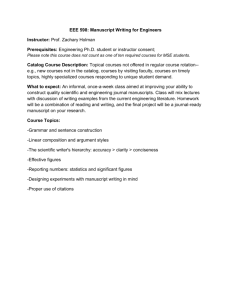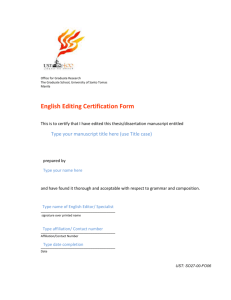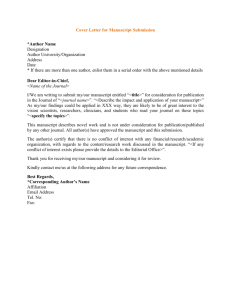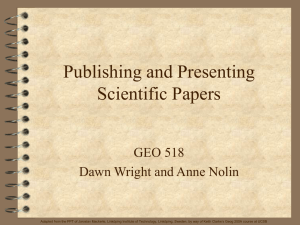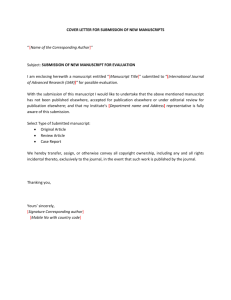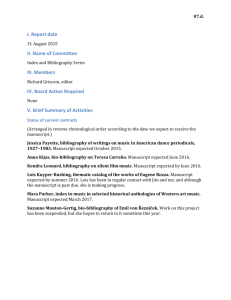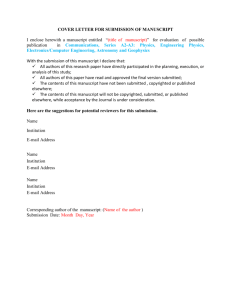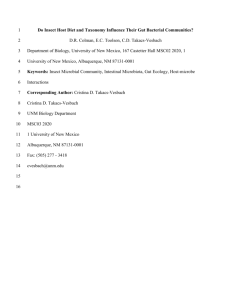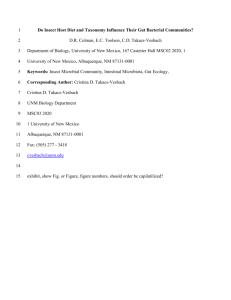Not bad reviews
advertisement
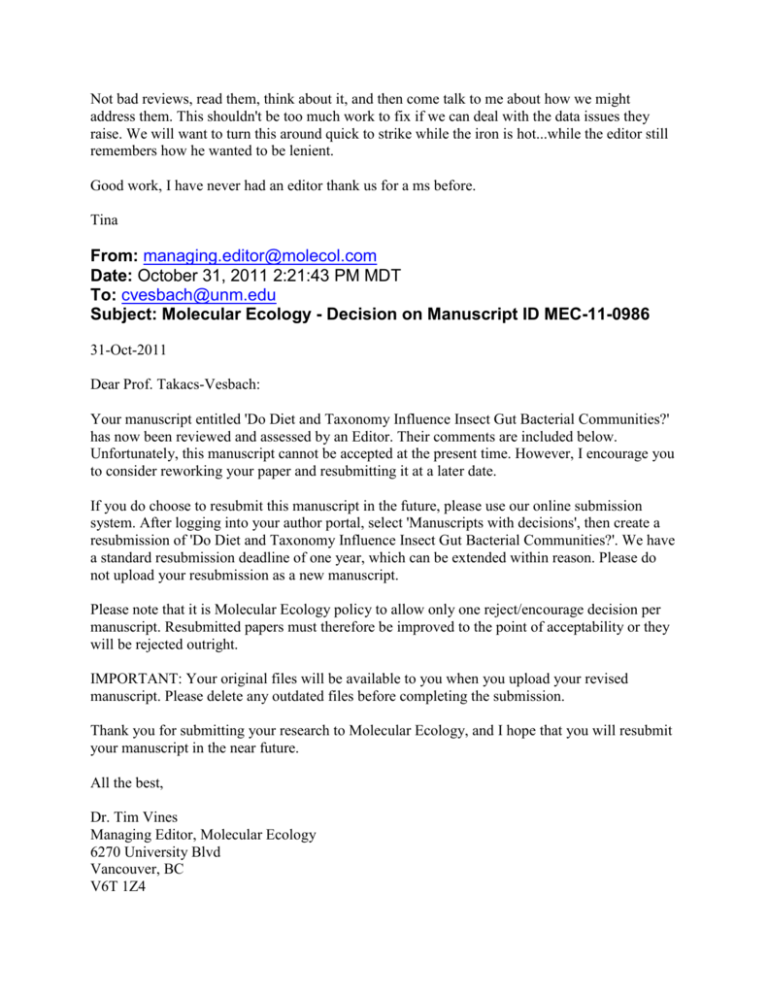
Not bad reviews, read them, think about it, and then come talk to me about how we might address them. This shouldn't be too much work to fix if we can deal with the data issues they raise. We will want to turn this around quick to strike while the iron is hot...while the editor still remembers how he wanted to be lenient. Good work, I have never had an editor thank us for a ms before. Tina From: managing.editor@molecol.com Date: October 31, 2011 2:21:43 PM MDT To: cvesbach@unm.edu Subject: Molecular Ecology - Decision on Manuscript ID MEC-11-0986 31-Oct-2011 Dear Prof. Takacs-Vesbach: Your manuscript entitled 'Do Diet and Taxonomy Influence Insect Gut Bacterial Communities?' has now been reviewed and assessed by an Editor. Their comments are included below. Unfortunately, this manuscript cannot be accepted at the present time. However, I encourage you to consider reworking your paper and resubmitting it at a later date. If you do choose to resubmit this manuscript in the future, please use our online submission system. After logging into your author portal, select 'Manuscripts with decisions', then create a resubmission of 'Do Diet and Taxonomy Influence Insect Gut Bacterial Communities?'. We have a standard resubmission deadline of one year, which can be extended within reason. Please do not upload your resubmission as a new manuscript. Please note that it is Molecular Ecology policy to allow only one reject/encourage decision per manuscript. Resubmitted papers must therefore be improved to the point of acceptability or they will be rejected outright. IMPORTANT: Your original files will be available to you when you upload your revised manuscript. Please delete any outdated files before completing the submission. Thank you for submitting your research to Molecular Ecology, and I hope that you will resubmit your manuscript in the near future. All the best, Dr. Tim Vines Managing Editor, Molecular Ecology 6270 University Blvd Vancouver, BC V6T 1Z4 Canada E-mail: managing.editor@molecol.com Editor Comments to Author: Thank you for submitting this interesting paper! Both reviewers have substantial criticisms and one recommends outright rejection. It does seem very ambitious to combine such different studies. However metagenomics is a developing field, most papers that I see are extremely descriptive so I am inclined to be lenient towards methodological deficiencies in manuscripts with ambition and ideas. However any revision has to deal with the bulk of points raised and also make the limitations of the study fully clear in the discussion. Dr. Daniel Falush Subject Editor, Molecular Ecology Reviewer Comments to Author: Reviewer: 1 Recommendation: Reject Comments: In this study the authors compared the bacterial community composition resided in the intestinal tracts of a wide diversity of insects, to test hypotheses that host diet and host taxonomy are related to gut bacterial community composition. It’s a very interesting topic in microbial ecology, and can expand our understanding on the symbiotic relationships between the bacteria and insects. This paper on the whole is very well-written. My major concerns: The authors showed a lot of biological informatic results to compare the divergence of gut bacterial community between insects of different taxonomic orders and diet types, but I have some concerns about the comparability and availability of the published 16S rRNA gene sequences that the authors got from previous researches for 58 insect species. As the authors pointed out in line 369-371,” the data were comprised from 37 separate studies, and thus the coverage reported on the communities, and methods used to identify the microbiota was likely different among the studies”, so the molecular characterization of the gut bacterial communities used different region of the 16S rRNA gene in different studies, and may prevent direct sequence comparisons to the findings among these studies. Eventhough the authors try their best to ensure every sequence comparison utilized at least 200 base pairs, it is my opinion that the sequence length are still not enough to clarify the difference of the bacterial community composition among different insects, and is a drawback in this paper. Furthermore, the number of bacterial clones in the above 37 studies are extremely varied, from 3 to 1252, so it's very difficult to make the comparation among different insect orders, especially the bacteria diversity and OUT richness, and sequence more clones would increase the number of phylotypes that detected. Therefore in my opinion, maybe it’s hard to say the gut bacteria species richness were related to the taxonomic order. Lastly, the results are well-described in the text, and describe the difference and general patterns of bacterial community among different orders clearly, however, it is my opinion that it is much better to pay more attention to structural and functional diversity analysis, which can help to clarify the effects of the host diet and orders on the gut bacteria composition. Additional Questions: Quality of Science: Mostly competent, but suffering from flaws of a technical or analytical nature Importance of Science: Research primarily descriptive and/or only relevant to the taxon being studied Quality of Presentation: Writing is clear, methods and data analyses are transparent, ideas make sense, proper grammar and spelling is employed, redundancy is avoided Does this manuscript require significant reduction in length? If 'Yes", please indicate where shortening is required in your specific comments: No Reviewer: 2 Recommendation: Reject, encourage resubmission Comments: This study is essentially a meta-analysis of published 16S rRNA gene clone libraries from insect guts (slightly extended with new data from 4 beetle species), to assess whether diet or host animal taxonomy determine the composition of the gut microbial community. This is an excellent question, and given the high number of published diversity studies to date, it is about time to utilize those published data for more general hypothesis testing. This having said, it is of utmost importance to ensure data quality and comparability of the diverse data sets used, otherwise the outcome will be quite questionable. One factor which apparently is ignored by the authors is coverage of the clone libraries used. With sequence numbers ranging from 3 to >300 per library, I suspect that differences in coverage will be severely influencing both accuracy and confidence of the richness estimates. This information must be included: add 2 columns to table 1: (i) coverage and (ii) OTU richness (with confidence interval); and, if necessary, must be used to further filter the data set. Another possible source of systematic errors is discrimination of certain taxonomic groups (e.g., Gram positives, Archaea – but they are unfortunately ignored here) by DNA extraction method or primer usage. This should be tested by a quick correlation analysis of DNA extraction method and frequency of taxonomic groups as well as primer set and frequency of taxonomic groups. Hopefully there will not be correlation but I have seen major effects in other studies. One further possible complication of the story is the change of diet that occurs after metamorphosis of most insects. Could a drastic change of diet from the larval stage to the adult leave its traces in the adult gut community as “leftover” OTUs from the previous diet class, hence obscuring a clearer, diet-related pattern? Specific comments: Also I enjoyed reading most of the manuscript the discussion gets lengthy towards the end and should, along with the conclusion, be shortened. Especially l. 341-387 need to be more focused and shortened. PCA: you analyse community composition vs. diet adn vs. taxonomy separately - would it be feasilble by MDSA to evaluate the effect of both simultaneously? Fig. 2: species ”AGg…” all have a grey bar instead of OTU data. Please explain (it is not mentioned in the figure legend). Additional Questions: Quality of Science: Mostly competent, but suffering from flaws of a technical or analytical nature Importance of Science: Research addresses a consequential question in ecology, evolution, behaviour, or conservation Quality of Presentation: Writing is clear, methods and data analyses are transparent, ideas make sense, proper grammar and spelling is employed, redundancy is avoided Does this manuscript require significant reduction in length? If 'Yes", please indicate where shortening is required in your specific comments: Yes

